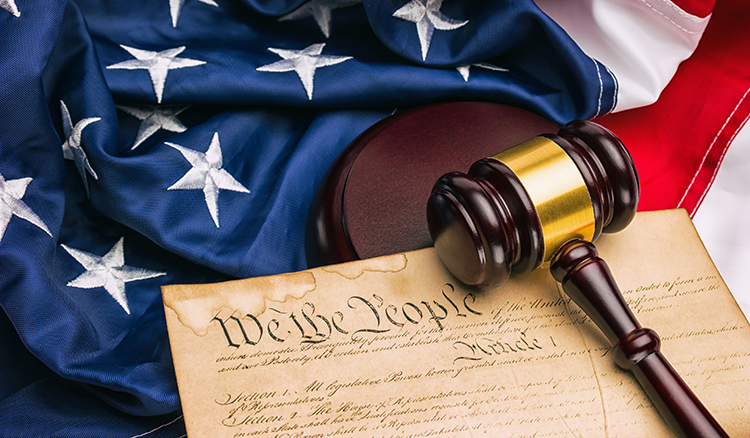Federal judge temporarily blocks Trump's 'blatantly unconstitutional' birthright citizenship order

(Image from Shutterstock)
A federal judge on Thursday issued a two-week restraining order blocking the Trump administration from moving forward on an effort to end birthright citizenship for the children of undocumented immigrants and foreign visitors, calling the directive “blatantly unconstitutional.”
U.S. District Court John C. Coughenour’s decision, which applies nationwide, came in response to a lawsuit from a coalition of states—Washington, Arizona, Illinois and Oregon—that argued that the White House executive order, which President Donald Trump signed Monday, violates the 14th Amendment.
Coughenour was skeptical throughout the brief hearing before issuing his ruling from the bench, telling Justice Department lawyers that the executive order “boggles the mind,” according to the Associated Press.
It was not immediately clear when Coughenour, who was appointed by President Ronald Reagan, would hold another hearing in the case.
“Trump’s birthright citizenship EO is halted for now,” Washington state Attorney General Nick Brown said in a social media post on X. “Today a judge granted our temporary restraining order nationwide, saying he had not seen an order this blatantly unconstitutional in 40 years on the bench. We’ll continue fighting for Washingtonians’ freedoms.”
The case is one of several lawsuits challenging Trump’s executive order, which the president said would take effect in mid-February. Another coalition of 18 states and Washington, D.C., filed a similar lawsuit in Massachusetts, and at least three different civil rights groups are pursuing their own legal challenges.
Trump’s executive order stipulates that his administration will no longer recognize automatic citizenship for children born on U.S. soil to immigrant parents who are in the country without authorization, provided that neither parent is a U.S. citizen or legal permanent resident.
It would also bar automatic citizenship for children born to noncitizen parents who are in the country on temporary work, student or tourist visas.
Birthright citizenship was established by the 14th Amendment and passed by Congress in 1868, and includes a clause reading: “All people born or naturalized in the United States, and subject to the jurisdiction thereof, are citizens of the United States and of the State wherein they reside.”
Trump aides said the executive order stipulates that the administration has authority to ban birthright citizenship because unauthorized immigrants are in the country illegally and, therefore, are not “subject to the jurisdiction” of the United States government.
In the lawsuit filed in federal court in the Western District of Washington, attorneys for the four states said the order violates the Constitution and argued that thousands of newborns in their jurisdictions would be harmed each year. Across the country, the filing states, an estimated 153,000 children are born to two undocumented parents annually.
The attorneys argued that their states would be required to undertake “disruptive” new operational and administrative burdens to help enforce the new policy and would lose revenue from the federal government to help provide Medicaid and other public benefits for children who are impacted.
“The individuals who are stripped of their United States citizenship will be rendered undocumented, subject to removal or detention, and many will be stateless—that is, citizens of no country at all,” the filing states, adding that they “will be placed into lifelong positions of instability and insecurity as part of a new underclass in the United States.”
The Trump administration responded in a court filing late Wednesday that the states lack legal standing to sue the federal government. Justice Department attorneys also argued that the executive order does not require state governments to pay for public benefits for the children who are denied citizenship or undertake new administrative procedures.
“These asserted harms are greatly outweighed by the harm to the government and public interest that would result from the extraordinary relief Plaintiffs request,” according to the administration’s response to the lawsuit. “As the Supreme Court has recognized, Executive officials must have ‘broad discretion’ to manage the immigration system.”
Write a letter to the editor, share a story tip or update, or report an error.



